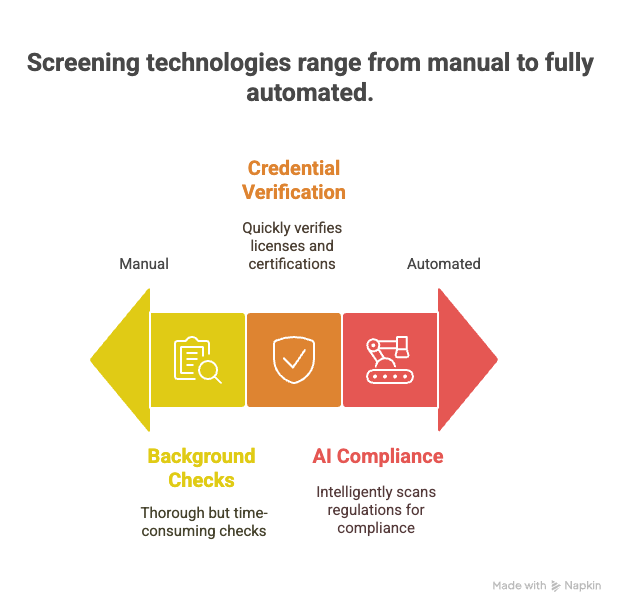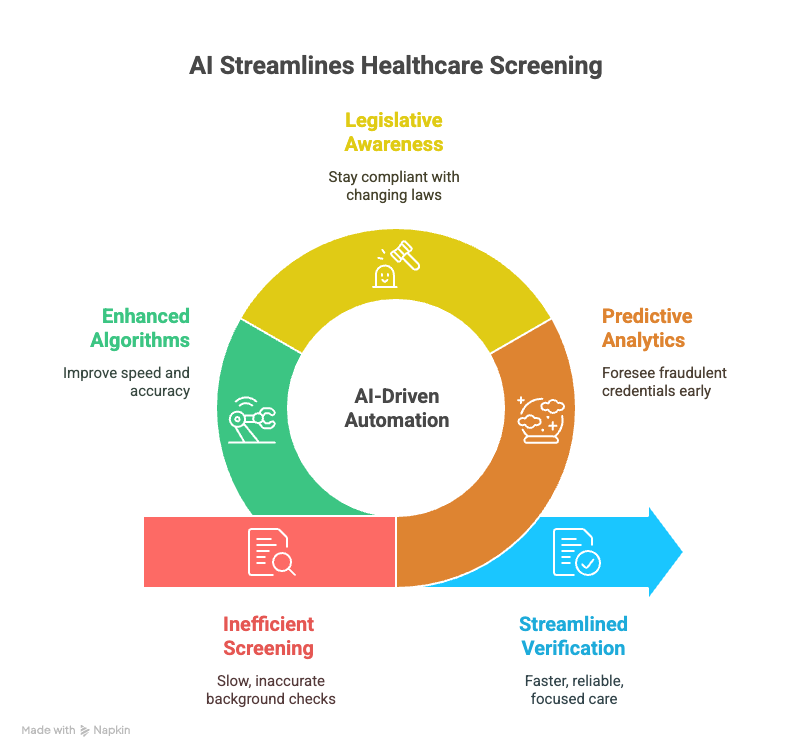The healthcare industry is rapidly evolving, with AI and automation at the forefront of transforming traditional processes. One vital area undergoing this transformation is background screening. This guide will dive deep into how these cutting-edge technologies are reshaping the way hospitals and healthcare facilities conduct background checks, ensuring compliance, and enhancing efficiency.
Key Takeaways
- AI accelerates healthcare background checks by automating manual tasks, saving time and effort for HR teams.
- By reducing human error, AI ensures more accurate and consistent verification of credentials, enhancing patient safety.
- Automation simplifies data collection, allowing HR to focus on strategic and interpersonal tasks like interviews.
- Maintaining data privacy and addressing potential biases are essential for ethical AI implementation in hiring.
- Staying updated with AI advancements and regulatory changes ensures more efficient and compliant hiring practices.
Introduction
AI and automation are rapidly changing industries across the board, and healthcare is no exception. With these technologies, hospitals and medical facilities are starting to revolutionize the way they operate, particularly in the sphere of background screening. As someone deeply entrenched in employment background checks for two decades, I've seen firsthand how AI is making these processes more efficient and thorough. This article will look at how AI and automation impact healthcare background checks, exploring both the benefits and challenges. By understanding these changes, you can grasp how this technology is shaping the future of healthcare hiring practices.
EXPERT INSIGHT: Conducting background checks is not just a back-end administrative duty but rather an essential hiring practice that can provide an advantage in the ever-evolving job market. This verification process helps mitigate the risk of fraudulent claims by candidates, which can negatively impact the organization. Fortunately, we have the technology to partner with in order to attain more efficient verification processes, empowering HR and decision-makers to make informed, data-driven decisions with confidence. - Charm Paz, CHRP
Automation in Healthcare Hiring
Automation in data collection simplifies the gathering of candidate information. Instead of manually handling resumes and forms, automated systems extract data directly from various sources. This process reduces time and errors, allowing HR to focus on evaluating candidates.
Integration with HR systems enhances operational flow. Automated tools easily sync with existing platforms, streamlining the hiring process. This means less paperwork and more time for strategic tasks like candidate engagement and retention planning.
HR professionals benefit immensely, turning their attention from clerical duties to strategic decisions. They can prioritize tasks that require human intuition, such as interviewing and team building, while automation tools handle repetitive operations.
Are you utilizing automation to its full potential in hiring? Consider how much more you could achieve by automating routine processes. It's not just about saving time—it's about enhancing your overall hiring strategy.
Key Technologies in Screening and Verification
In the world of healthcare, ensuring that the right people are in the right positions is non-negotiable. That's where advanced screening technologies come into play. Hospitals use sophisticated systems to perform thorough background checks, which are crucial for maintaining high standards.

Automated credential verification systems have changed the game. They quickly verify professional licenses and certifications. Gone are the days of tedious, manual check-ups. With automation, credentials get checked against certification databases in real-time, cutting down the time HR teams spend on this task significantly. Imagine turning days of work into minutes.
AI plays a crucial role in staffing compliance. These intelligent systems scan and interpret regulations, ensuring each hire meets current legal and internal standards. They work tirelessly, ensuring nothing slips through the cracks. Think of AI as the steady hand guiding compliance efforts without wavering.
When you consider these technologies, ask yourself: Are you making the most of what's available to streamline and secure your hiring processes? These tools are not just about efficiency—they’re about enhancing reliability at every step.
Challenges and Considerations
When embracing AI and automation for healthcare background checks, data privacy and security are top concerns. Sensitive information about employees and patients requires rigorous safeguards. Encryption and access controls are critical to protect this data from breaches. Are your current systems secure enough?
Ethical concerns also arise with AI. Automated decision-making can introduce bias if not carefully managed. Some AI systems may inadvertently favor certain groups over others. It’s essential to regularly audit these systems to prevent discrimination. How do you ensure fairness in your processes?
Implementing AI and automation is not without hurdles. Organizations face integration challenges with their existing IT infrastructure. Training staff to operate new technologies can also be daunting and resource-intensive. Are you prepared to invest the time and effort needed for a smooth transition? Addressing these challenges head-on will pave the way for successful adoption and utilization of AI in healthcare background screening.
The Future of AI and Automation in Healthcare Background Screening
Emerging trends in AI and automation promise to redefine healthcare background screening. Predictive analytics is one such trend. It enables organizations to foresee issues like fraudulent credentials before they become problems. Hospitals that use predictive models could target gaps in their screening process, strengthening the hiring of qualified professionals.
Legislation around AI and automation is in constant flux. With policymakers and stakeholders reviewing the impact of these technologies, shifts in regulations seem inevitable. Staying abreast of these changes will be crucial for hospitals to remain compliant and efficient.
Growth opportunities in this field are abundant. AI technology continuously evolves, offering new ways to refine background checks. Enhanced machine learning algorithms could improve the speed and accuracy of screenings, making the process more reliable. As AI becomes more intuitive, healthcare facilities could see a reduction in the time spent on verification, allowing staff to focus more on patient care.

Are you ready to explore these advancements? Integrating AI-driven solutions could help you maintain a competitive edge. Consider how these technologies could fit into your existing systems and the benefits they might offer in terms of efficiency and accuracy.
Conclusion
AI and automation are revolutionizing healthcare background checks. Faster processes, reduced errors, and improved data accuracy are just some of the benefits. These tools allow for more secure and efficient hiring, ensuring healthcare workers meet the necessary standards.
Back in the early days of my career, background checks involved mountains of paperwork and countless hours of manual verification. Human errors were common, and processes lacked consistency. Today, AI can analyze vast datasets with precision, ensuring that each candidate’s credentials are verified thoroughly and accurately.
Imagine focusing less on the tedious tasks and more on strategic decisions that matter. Automation in data gathering streamlines how candidates’ details are collected and integrated into HR systems. This shift lets HR teams focus on roles that require human judgment and interaction, like interviewing and culture fit.
But what about privacy? AI is only as good as its design and the data it processes. It's essential to secure candidates' information, ensuring that people's privacy is respected while harnessing the technology's efficiency.
Integrating AI and automation doesn't just comply with current laws; it anticipates future legislative changes. This forward-thinking approach positions healthcare facilities to adapt quickly to regulatory shifts.
If you're responsible for hiring in healthcare, embracing AI will keep your organization agile and your patients safe. It's time to align technological innovation with ethical practices, providing the best care possible.
Frequently Asked Questions (FAQs)
What is the role of AI in healthcare background screening?
AI can quickly analyze large volumes of data to identify discrepancies in a candidate's resume. It helps in verifying credentials, work history, and criminal records more accurately than manual checks.
Is it legal to use AI for hiring background checks?
Yes, but you must comply with laws like the Fair Credit Reporting Act (FCRA) and local privacy laws. Transparency and maintaining consent are crucial.
How can hospitals automate license verification?
Hospitals can use AI-driven systems that automatically check licensing databases. This ensures that healthcare professionals maintain current certifications without manual intervention.
Does automation help with FCRA compliance?
Automation streamlines the compliance process by ensuring all necessary data is collected accurately and efficiently. It also aids in generating reports that meet FCRA standards.
What are the risks of using AI in employee screening?
AI can introduce biases if the algorithms are not well-designed. It may also overlook nuances in a candidate's history, leading to potential errors in judgment.
How can AI improve the accuracy of background checks?
AI can analyze data from multiple sources quickly, reducing human error. For example, it can cross-reference public records with employment history to spot inconsistencies.
What should you consider when implementing AI in background screening?
Choose solutions that prioritize data privacy and security. Ensure the AI is trained on diverse datasets to minimize bias and keep systems updated with the latest legal requirements.
Can AI help reduce the time taken for background checks?
Yes, AI can process vast amounts of information in a fraction of the time it takes for manual checks. This helps in making faster hiring decisions without compromising accuracy.
Are there specific AI tools for healthcare background checks?
Various tools are tailored for healthcare settings, focusing on aspects like license verification and credentialing. It's wise to select a tool that integrates well with existing HR systems.
Definitions
Background Checks
Background checks are the process of reviewing a candidate's history to confirm their qualifications, professional experience, and legal records. In healthcare, these checks help ensure patient safety by verifying licenses, certifications, and any past criminal activity. For example, a hospital might use background checks to confirm whether a nurse has a valid license and a clean disciplinary record.
Regulatory Compliance
Regulatory compliance means following the laws, rules, and guidelines set by official bodies like the Equal Employment Opportunity Commission (EEOC). In hiring, this includes applying non-discriminatory practices and ensuring proper documentation. Missing the mark can lead to legal issues or damage your organization’s reputation. Is your hiring process aligned with current regulations?
Credential Verification
Credential verification is the process of confirming that a candidate's claimed qualifications—such as degrees or licenses—are legitimate. Automated systems now check these in real-time through official databases. For example, instead of calling a licensing board, software can confirm a doctor’s certification within minutes.
Candidate Screening
Candidate screening refers to the steps taken to evaluate if someone is suitable for a specific role. This usually includes reviewing resumes, checking work history, and verifying references. In healthcare, consistent screening helps reduce the risk of hiring staff who could endanger patients. How thorough is your screening process?
Staffing Compliance
Staffing compliance ensures all employees meet both internal policies and external regulations. In healthcare, this includes verifying credentials, background checks, and job eligibility criteria. AI helps by consistently checking each hire against current standards. Think of it as making sure every new hire is fully cleared before they step into a role.
References
- 2025 Trends in the Background Screening Industry – Certn:
https://certn.co/blog/2025-trends-in-the-background-screening-industry/ - 2025 Watch List: Artificial Intelligence in Health Care – Canada’s Drug Agency / NCBI Bookshelf:
https://www.ncbi.nlm.nih.gov/books/NBK613808/ - Artificial Intelligence in Healthcare: Transformations in 2025 – Medical Realities:
https://medicalrealities.com/artificial-intelligence-in-healthcare-transformations-in-2025/

GCheck Editorial Team
Meet the GCheck Editorial Team, your trusted source for insightful and up-to-date information in the world of employment background checks. Committed to delivering the latest trends, best practices, and industry insights, our team is dedicated to keeping you informed.
With a passion for ensuring accuracy, compliance, and efficiency in background screening, we are your go-to experts in the field. Stay tuned for our comprehensive articles, guides, and analysis, designed to empower businesses and individuals with the knowledge they need to make informed decisions.
At GCheck, we're here to guide you through the complexities of background checks, every step of the way.





